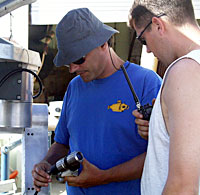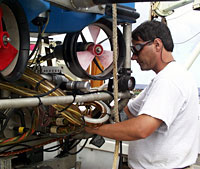|
|
Interviews: Marine Engineer Robert “Yogi” Elder
Question:
What qualities are important in an expedition leader? Andy: A big part of it is being able to communicate well with people. It helps to understand something about the technology. And it helps to be able to anticipate problems before they occur. Question: What are some challenges of your job? Andy: Balancing the expectations of the scientists with the capabilities of the equipment. For example, a scientist may wish for Jason to carry more equipment than is possible because it is too big or too heavy (Jason can carry up to 150 pounds in the water). Then we’ll work together to modify their plans. Question: Since the scientists want to use Jason and the other vehicles as much as possible while we’re at sea, you work long days preparing and caring for the equipment. In the past, what’s the longest stretch you’ve worked without sleep? Andy: Thirty to 36 hours, something like that. It happens on occasion. Question: I understand that you are building a new Jason at Woods Hole. Tell me about that? Andy: This Jason has been in the field for about 10 years. Technology has changed a lot in that time, so even though this Jason has been upgraded and enhanced, we have reached the point where we need to redesign the vehicle using the latest technology. Jason II will have an improved capability in terms of manipulation - two manipulator arms instead of one - and a larger payload, meaning it will be able to carry more weight. We’ve got the design and a lot of the parts. We’ll begin putting the vehicle together this fall. It will be ready to go next summer. Question: When you’re not working on board the ship, what do you like to do? Andy: There isn’t much to do except sleep. Typically we have a lot to do, so we’re either working or sleeping. Oh, I’d like to say we do puzzles or watch movies, but there isn’t a whole lot of time for that. Question: What’s the weirdest thing you’ve ever carried on Jason? Andy: An IMAX camera to film a shipwreck in Lake Ontario.
|
|||
Mailing List | Feedback | Glossary | For Teachers | About Us | Contact
© 2010 Dive and Discover™. Dive and Discover™ is a registered trademark of
Woods
Hole Oceanographic Institution
 Andy Bowen was in high school when he became
interested in the ocean. He earned a mechanical and ocean engineering
degree from the University of Rhode Island. Now 42 years old, Andy
lives in Woods Hole, Massachusetts with his wife Linda, who is studying
genetic counseling. He enjoys sailing and preparing with Linda for
the birth of their first child, due in two months.
Andy Bowen was in high school when he became
interested in the ocean. He earned a mechanical and ocean engineering
degree from the University of Rhode Island. Now 42 years old, Andy
lives in Woods Hole, Massachusetts with his wife Linda, who is studying
genetic counseling. He enjoys sailing and preparing with Linda for
the birth of their first child, due in two months. 